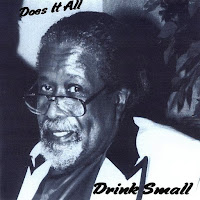A catching album from a catching blues artist. Harrison Kennedy has an Irish name, is from Canada and sings like an old Mississippi country bluesman. A guitar, banjo or mandolin and a harmonica, with spoons percussion from time to time, is all he needs. Able to reach a high pitch at times, Kennedy has crafted a very captivating vocal and musical signature, far from what he was singing in the million albums selling Detroit soul group Chairmen Of The Board in the early seventies, or with Marvin Gay as a guest !
About the blues he confessed one day : "Blues has always been deeply anchored in me. Before the abolition, some of my slave ancestors ran away from southern plantations up to Canada, but a large part of my family stayed in Tennessee. When I used to visit them in my youth, I was always deeply moved by the soul of this music who had helped them to survive. Contrary to what most people think, blues is not a sad music, it helps to overcome sorrow and hardship."
His songs are the exact illustration of this philosophy. Listening to Kennedy is a voyage deep down in the old South, from the farms of the Mississippi Hills and the Delta cotton fields to the damp Louisiana lands. He's a gifted songwriter and his meaningful and sometimes caustic lyrics are carried by his roots vocal texture.
His guitar, banjo or mandolin and his harmonica keep down-home, at the service of his words. Some songs are rhythmically enriched with a bass and less frequently, with tasty and discreet organ or accordion lines, or in a quite modern way by a (wah-wah) electric guitar in the background.
The songs featured in this collection are varied and imaginative but keeping a musical unity. The only wrong note of the album is the final track "You Don't Know Me". It doesn't fit at all and should have been removed in my opinion.
The same year this album came out (2011), Harrison Kennedy reached second place among 83 participants at the Blues Foundation's International Blues Challenge, in the solo artist category. Given his great talent, this is anything but surprising. What's hard to figure out is how he didn't win !
- Toronto Blues Society's Pioneer Profile Series, H. K. in conversation with 2021 Juno nominee Julian : https://youtu.be/atGwehw-NRY
- At the Winterfest in Hamilton, Ontario, in 2021 : https://youtu.be/cUIW-oQfDA4
- In the "Who is" epicReel series : https://youtu.be/9U7Qy7wTwe4
- At the 2013 Orangeville Blues and Jazz festival : https://youtu.be/KDitoHTJzhI
- At the 2014 Blues Music Awards Live on Blues Radio International : https://youtu.be/9Y53e1cPEj0
- Performing "Shame The Devil" at the Club Belvedere in Thorold, 2011 : https://youtu.be/8DXayQJjLeo
- On Talkin Blues Video Podcast, episode 43 : https://youtu.be/T1fdhdTXW0
- At the 10th Anniversary of the Waterfront Blues Festival in Woodbine Park, 2014 (Harrison Kennedy - vocals & guitar/"Nappy" Keith Lindsay - keyboards/Justin "The Kid" Dunlop : bass) : https://youtu.be/cQuSfiQM2-8
- At the 2011 Underground Railroad Music Festival in Drayton, Ohio : https://youtu.be/01CXFlLtNgQ
- At the "McHattie for Mayor" Fundraiser in 2014 : https://youtu.be/IHb0xdS10Qk_________________



















